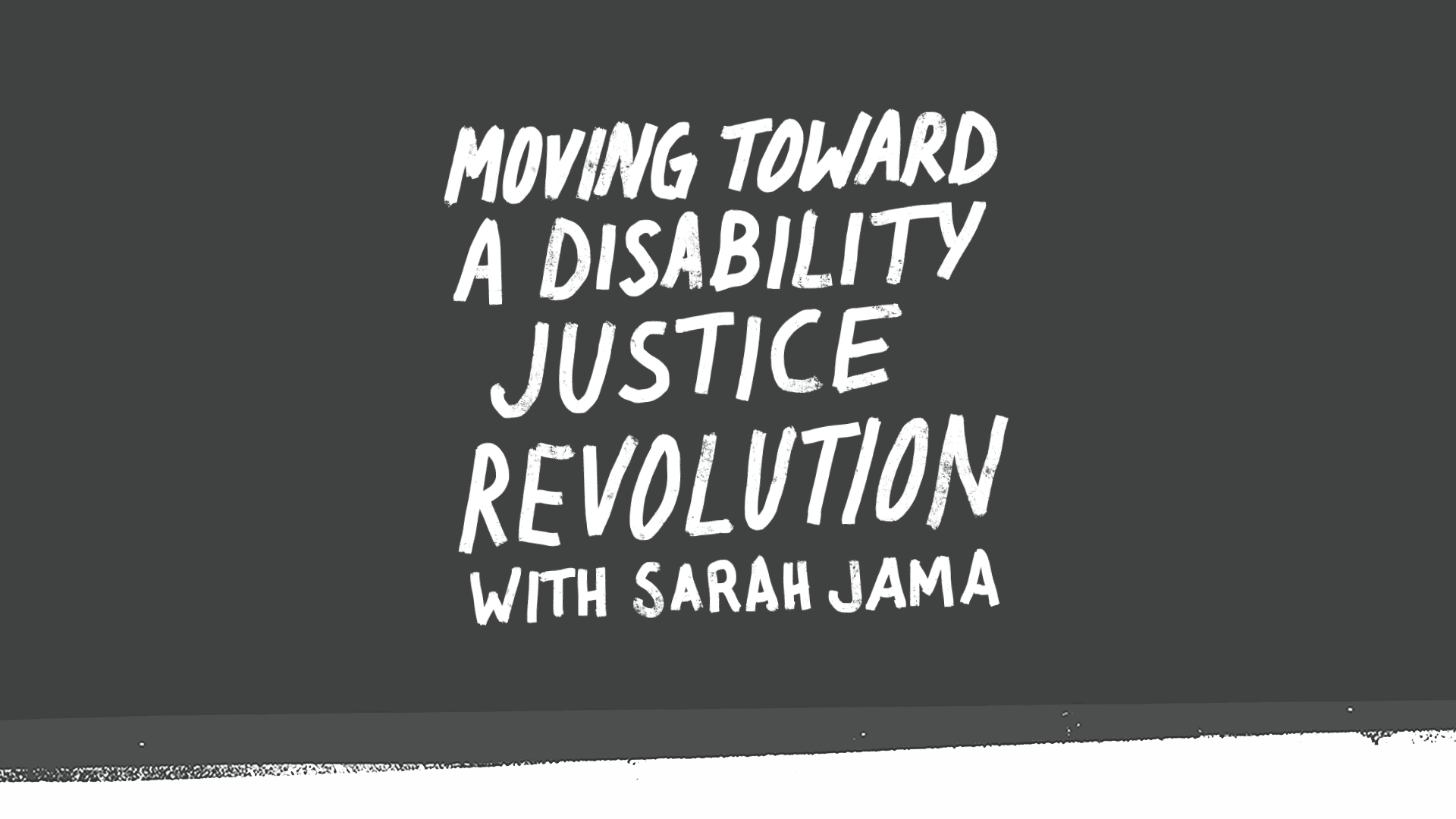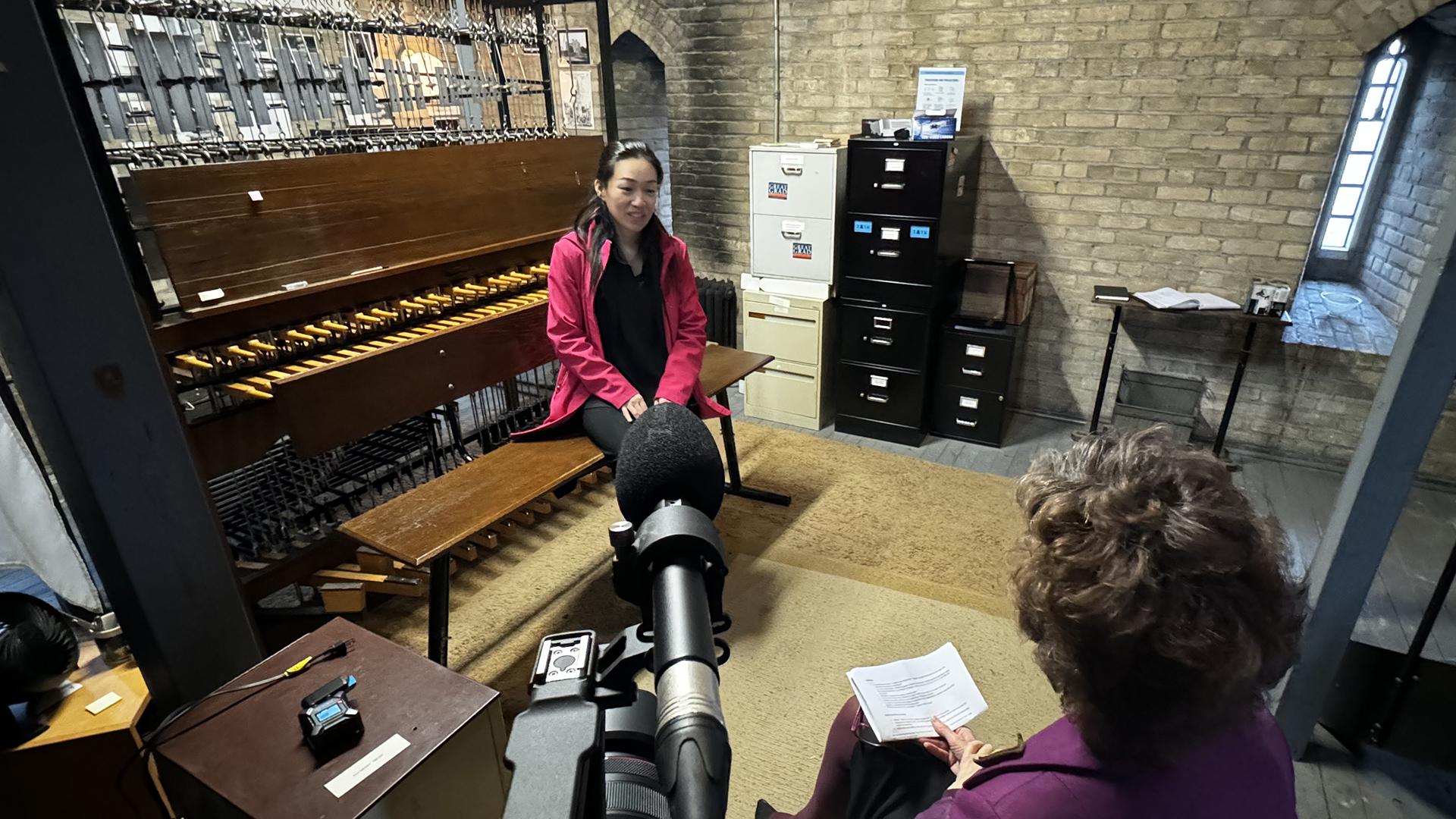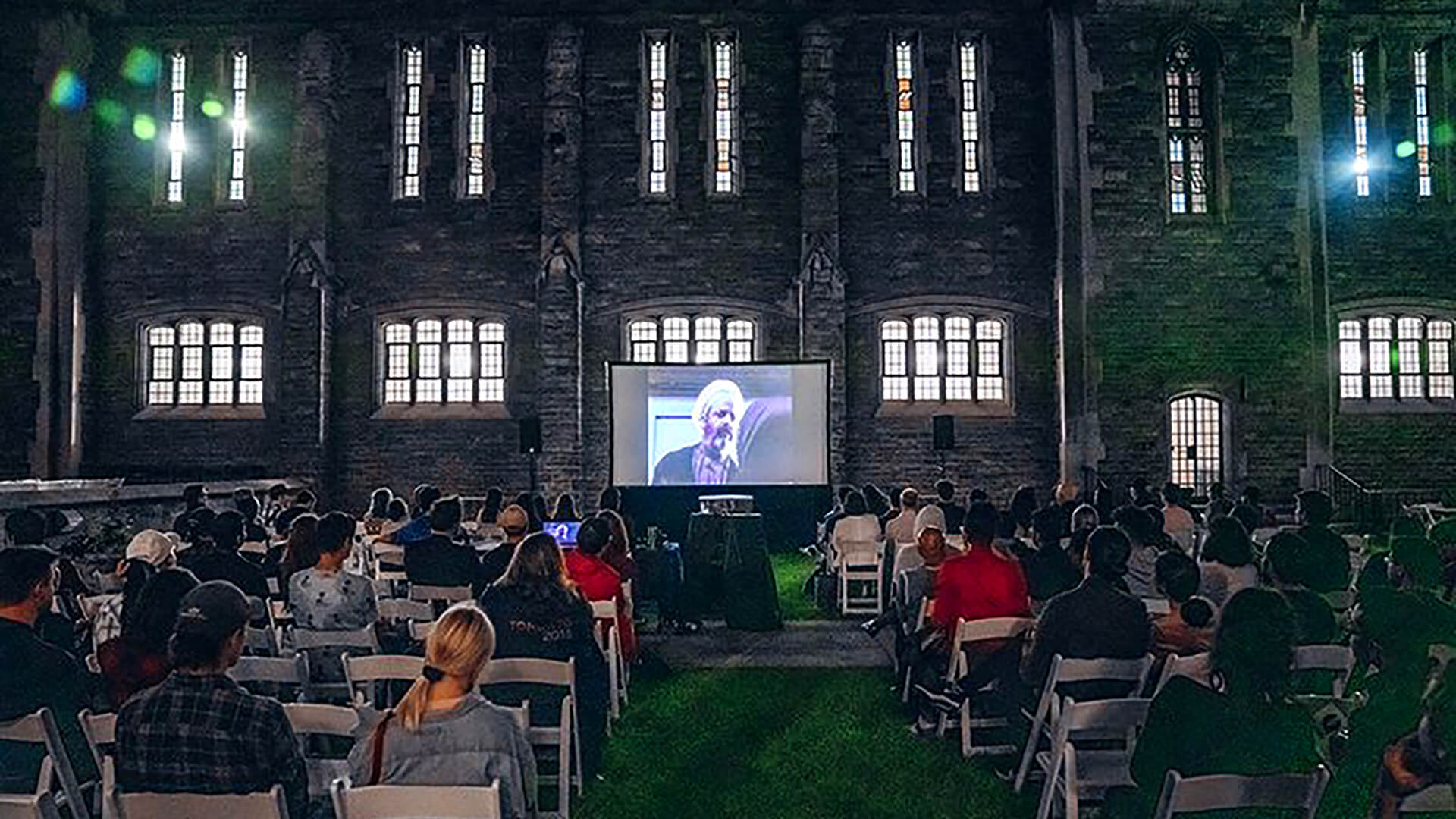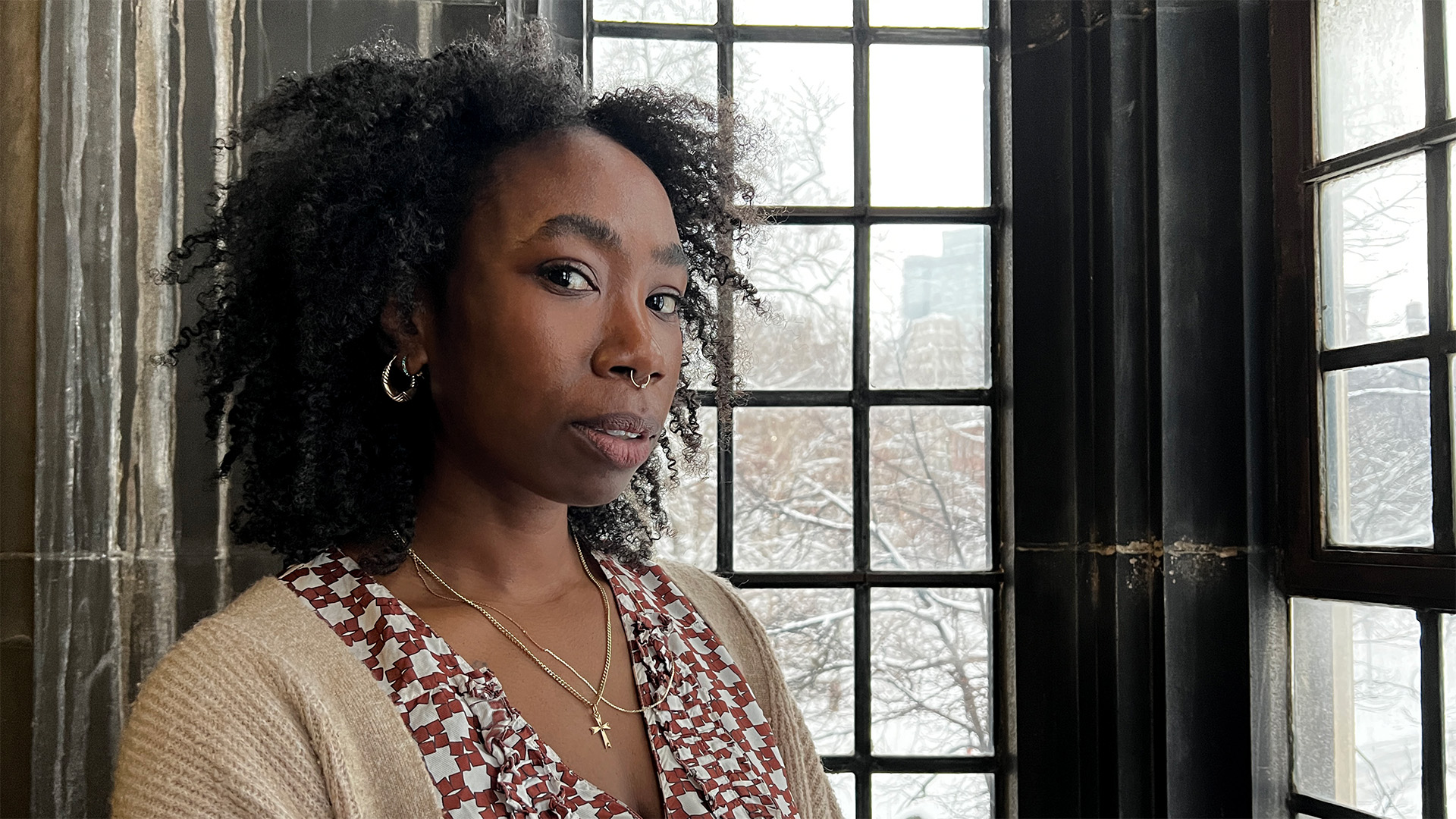
The Hancock Lecture took place on February 6, 2019 at Hart House. We spoke with Sarah Jama, community organizer and co-founder of the Disability Justice Network of Ontario (DJNO) about her talk.
Q: You’re a co-founder of the Disability Justice Network of Ontario (DJNO). Can you share with us why and how you co-founded this organization? What do you hope to achieve?
A: Co-founders Shanthiya Baheerathan, Eminet Dagnachew, and I all met at McMaster University through working with the McMaster Student Union (MSU). Eminet was working with me to run programming for people with disabilities, and Shanthiya was managing a service called the Women and Gender Equity Network. Throughout our time engaging in this work, we were each, in our own way, frustrated with a number of issues. What stood out to me was how many silos existed in the student union, particularly around the equity seeking services. The student union was structured to conduct issues-based work using a service user framework instead of a community organizing framework. To me, this looked like the different services operating in their corners of the world, without any crossover. Disability issues were separate from queer issues, were separate from women’s issues, and were separate from food justice issues. It wasn’t until people of colour got involved more intentionally in the student union that crossover began to exist more frequently. As black and brown women with various intersections of class and disability, we often talked about how disability issues, in particular, were treated as existing on an island.
This, to me, was a testament to larger issues at play in the disability community. Our rhetoric around disability is stuck in the nineties, still focused heavily on service user language and charities and not focused on the structural root causes that people with disabilities face. I don’t want to talk about access to public institutions for the sake of exerting my economic purchasing power or to talk about equality or people with disabilities being valued and loved the way they are. I know we have value. I don’t need to participate in capitalist structures in order to feel this. I want to challenge the way the prison industrial complex in Canada thrives upon the criminalization of people with disabilities who are people of colour. I don’t want to sit here and argue that people with disabilities are employable. I want to challenge the way the bodies of people with disabilities are seen as disposable or treated as unworthy because a lot of us don’t fit common and often exploitative understandings of productivity.
As three black/ women of colour with disabilities, we created this organization as a way to address all of these issues using a framework of Disability Justice. Disability Justice is a term created by Sins Invalid in Oakland, an epic organizing group and arts collective of black and queer disabled artists who sought to change the way people talked about disabilities. The ten principles they consider disability justice frameworks to adhere to the following: intersectionality, anti-capitalist politic, a commitment to cross-movement organizing, recognizing wholeness, sustainability, cross-disability solidarity, interdependence, collective access, and collective liberation. Through adhering to these principles, our vision at the Disability Justice Network of Ontario is to create a world where people with disabilities are free to be. Our Mission is to build a just and accessible Ontario, wherein people with disabilities: have personal and political agency, can thrive and foster community, build the power, capacity, and skills needed to hold people, communities, and institutions responsible for the spaces they create. Our values are:
- Accountability: Our work is community-led and accountable to people with disabilities.
- Building Community Capacity: We work collaboratively with local community members, movements and organizations to seek equity and justice for people with disabilities.
- Justice: We work beyond current legislation to prioritize access, empowerment, and liberation for people with disabilities, including the creation of sustainable support systems.
- Open Door: Our door is always open. We welcome all people who support DJNO’s vision, mission, and values regardless of ability, race, religion, age, sexual orientation, gender or economic status.
- Resource Sharing: We are committed to supporting those with the least resources first, and addressing the dynamic needs of our communities equitably.
- Self-Determination: We respect and support people with disabilities and the choices they make to build better futures for themselves and their collectives. This includes the choice to disclose, discuss and manage their disability.
You’re working with the Hamilton Wentworth District School Board to create curriculum around combating anti-black racism. What are some of the challenges and opportunities that in your opinion exist in our current school system?
One of the major challenges that I see with school boards across the province, which [is] being rectified in many cities, is the lack of race-based data collection across Ontario. If we don’t have a way to quantitatively discuss who is in our school systems we can’t properly create a curriculum that speaks to the experiences of all students.
I am super excited to be working through the Hamilton Centre for Civic Inclusion and in partnership with the Hamilton Wentworth District School Board to create programming specific to teaching black youth in our city about civic engagement, in group mentorship settings. We have speakers such as Desmond Cole, Robyn Maynard, and Sandy Hudson coming to share a sleuth of experiences and advice with black young adults to prepare them for what it means to navigate various spaces and institutions in their skin as they transition out of high school.
What do you hope Hancock 2019 guests will take out of attending the event?
I want people to understand the history of disability justice, why it is important, and how we can move forward. Fundamentally, I want to create an environment where we can discuss issues facing the way we address issues in the disability community, and challenge people to imagine a new world. There is a way forward; we just need to find it. I also want them to understand and unpack the ways in which we view movement building, which often times, especially in disability circles, centres itself around whiteness. Nothing about us without us needs to include our indigenous, black, and people of colour comrades with disabilities as well. I’m excited to map out ways forward using a disability justice framework.
You only graduated in 2017, but you already have quite an extensive resume. You’ve also received awards and recognitions like the Evelyn Myrie Political Action Award (March 2017) and a nomination for Women of Distinction Award (Feb. 2017). You were also dubbed CBC Hamilton’s Top 5 Most Interesting People of 2016 (December 2016). What drives you to work so hard? What tips can you offer a student or recent grad?
I work hard for many reasons. Mainly, it’s because I believe in whole-heartedly what I’m doing.
I credit a lot of my success to my friend and mentor, Matthew Green, the first black City Councillor in Hamilton Ontario. He has and continues to push me to take on leadership opportunities and challenges that are traditionally taken up by able-bodied cis-gendered white men. I would say go out and find mentors you can relate to, who believe in your leadership, and who can use their experiences to build on or support your work.
December 3rd marked International Day of Persons with Disabilities, a day when we commit to creating a more inclusive and accessible society for people of all abilities. This year, it coincided with the conclusion of the House of Commons hearings on Bill C-81—the Accessible Canada Act. Introduced last June, this piece of legislation has been decades in the making and marks what’s been hailed a significant victory for the disability community. Do you agree? What’s your take on this Bill? What else should the federal government do?
There have been many concerns with the framing of the new bill, spearheaded by David Lepofsky and signed onto by many disability organizations, including the Disability Justice Network of Ontario. It follows a complaint based model that places the onus on people with disabilities to file complaints repetitively in order to have enforcement of accessibility regulations in place. If the institution being complained against has access to funds, they can delay the process by paying fines that are issued due to accessibility violations. I think that there should be a way for this legislation to be more proactive versus reactive.
Lastly, for people who have no disabilities or know anyone with a disability, and are thus removed from that reality, do you have any messages?
I hope people without disabilities who attend the lecture come in with open minds and open hearts. One of the leading causes of disability is old age. If folks don’t know anyone with a disability, it’s still likely to affect you over time. Disability Justice is about creating a world where we all fit, with structures that uphold and protect those who are often pushed out of spaces and of society. We all have a part to play in the solutions.



